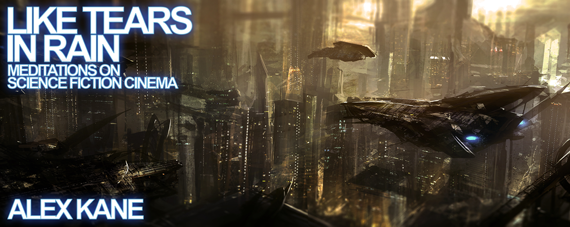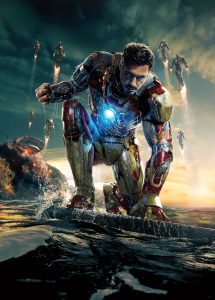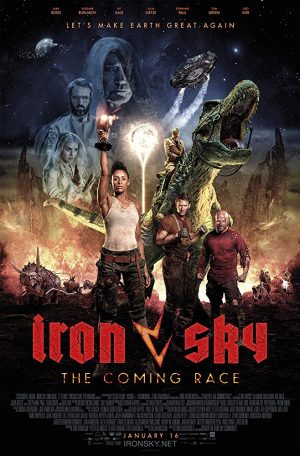
Iron Man Three surpasses its predecessor, Joss Whedon’s The Avengers, in one very exciting and fundamental way: it feels more like an actual comic book than any single Marvel flick before it—hell, maybe more than any comic adaptation, period. It celebrates the humor and cool-gadgetry flair of the first two Iron Man flicks while simultaneously shoving billionaire “mechanic” Tony Stark (Robert Downey Jr. in the role of his career) into his proverbial dark night of the soul. No small thing for a former military industrialist-turned-Avenger.
Defying expectations at a number of cleverly scripted turns, the film proves to be the most intelligent in the series by a marked degree. Whereas in previous installments Stark remarked that he and the hot-rod red suit were a single heroic entity, Shane Black’s first entry in the series establishes that the man makes the suit, not the other way around.
It does so by having Stark wear the suit, oddly enough, as rarely as possible. And the movie is no weaker for it. Honest. In fact, we grow to know Tony Stark’s visage as the true face of Iron Man; in Iron Man Three, anyone might be behind the mask. Or no one, even—the suits are now equipped with a Jarvis-integrated AI autopilot system that allows them to act independently of their maker, which makes for some nice Mission: Impossible-style, all-is-not-as-it-seems theatricality.

Without getting too pretentious and philosophical, I’ll just say that the film asks important questions about the nature of humanity and our conception of a “soul,” shedding light (and in some cases, explosive heat) on the possible downsides to technological evolution and even transhumanism. But it’s not exactly clean-cut or heavy-handed about it; the very same mutagenic technology that gives the Mandarin and his minions such wicked strength and resilience also saves the life of Stark’s beloved partner, Pepper Potts.
A young boy living in rural Tennessee saves Tony’s life at one point. Pepper—and don’t go crying “spoiler,” because it’s in the freaking trailer—dons the Iron Man armor in another tense scene of mass destruction and saves Stark’s life with his own suit.
The movie’s endgame features a grandiose spectacle of unmanned—iron men?—arriving to tip the tide of battle during a final showdown with the murderous Mandarin as he prepares to assassinate the president of the United States in downright savage fashion. And no, I ain’t talking about the paintjob on Iron Patriot, renamed thusly because apparently “War Machine” was—ahem—a little too on-the-nose in its description of American foreign policy.
Stark’s army of iron mirror-selves assists him in his battle against the film’s upstaging surprise villain (spoiler alert! spoiler alert! . . .), played perfectly and effortlessly, it seems, by a transformed Guy Pierce. Not transformed in terms of appearance so much as by the seductive nature of both technological progress’s promise of human perfection and its implications for an inevitable social reordering. A spurned admirer from Tony’s past, Pierce plays a scientist named Aldrich Killian who develops a viral mutagen known as Extremis: the next step toward humankind’s ascent to godhood, save for a few vital flaws—for instance, addictive properties and side-effects like causing the user to explode.
The film succeeds so admirably on the grounds of its boldness, risk-taking, and Downey’s voiceover narration, which serves to tie the experience together as a self-contained “comic book story arc” within the larger context of Marvel’s Cinematic Universe and its flagship achievement, The Avengers.











Just got home from finally seeing it. I must respectfully disagree. It’s the least comic book like of all the movies.
When i read comics in the 70s or 80s, they were about the costumed/armored characters, with brief appearances of their alter egos. This movie should have been called Tony Stark 3. It had very little iron man in it.
A fine movie, but an inferkor Ironman movie.
It was interesting that he didn’t spend much time in the suit this time around. I honestly didn’t think the second movie was very good but this one was an improvement. I got the sense when I watched the second one that there were a lot of elements that got cut out of the movie. When they talked about Stark’s father and how he dealt with a Russian scientist, and sounded like they were making some vague allusions to capitalism versus communism, but they never really made that clear.
I don’t really follow comics anymore though I once did, but I remember someone referring to “Extremis” in another context, so it sounds like they are keeping the movies pretty tied into the comics.